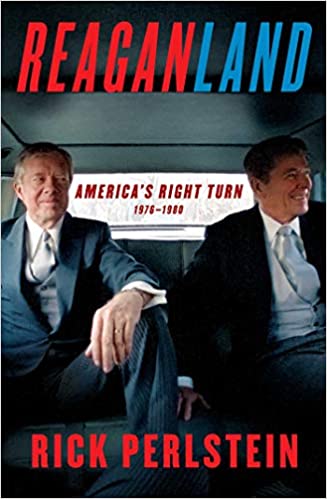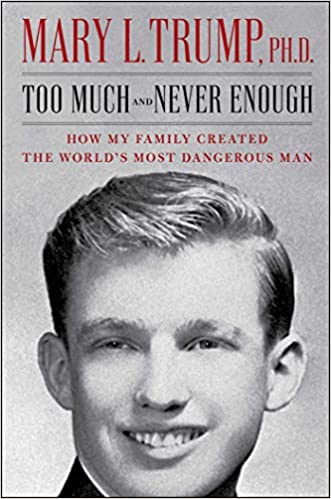
REAGANLAND
by Rick Perlstein
From the bestselling author of Nixonland and The Invisible Bridge comes the dramatic conclusion of how conservatism took control of American political power.
Over two decades, Rick Perlstein has published three definitive works about the emerging dominance of conservatism in modern American politics. With the saga’s final installment, he has delivered yet another stunning literary and historical achievement.
In late 1976, Ronald Reagan was dismissed as a man without a political future: defeated in his nomination bid against a sitting president of his own party, blamed for President Gerald Ford’s defeat, too old to make another run. His comeback was fueled by an extraordinary confluence: fundamentalist preachers and former segregationists reinventing themselves as militant crusaders against gay rights and feminism; business executives uniting against regulation in an era of economic decline; a cadre of secretive “New Right” organizers deploying state-of-the-art technology, bending political norms to the breaking point—and Reagan’s own unbending optimism, his ability to convey unshakable confidence in America as the world’s “shining city on a hill.”
Meanwhile, a civil war broke out in the Democratic party. When President Jimmy Carter called Americans to a new ethic of austerity, Senator Ted Kennedy reacted with horror, challenging him for reelection. Carter’s Oval Office tenure was further imperiled by the Iranian hostage crisis, the Soviet invasion of Afghanistan, near-catastrophe at a Pennsylvania nuclear plant, aviation accidents, serial killers on the loose, and endless gas lines.
Backed by a reenergized conservative Republican base, Reagan ran on the campaign slogan “Make America Great Again”—and prevailed. Reaganland is the story of how that happened, tracing conservatives’ cutthroat strategies to gain power and explaining why they endure four decades later.

BEYOND VALOR
by Jon Erwin & William Doyle
Beyond Valor is one soldier’s extraordinary tale of bravery, heroism, faith, and devotion.
“Amazing…A thrilling and poignant story of patriotism that all Americans can be stirred, moved, and encouraged by.” — Gary Sinise
On April 12, 1945, a fleet of American B-29 bombers flew toward Japan. Their mission was simple: stop World War II by burning the cities, factories, and military bases of the Japanese empire, thereby forcing an unconditional surrender. Yet the mission did not go as planned. On board one of the B-29s, the City of Los Angeles, a phosphorus bomb detonated inside the plane. Staff Sergeant Henry E. “Red” Erwin absorbed the blast of burning phosphorus yet managed to throw overboard the still-flaming bomb, before collapsing from the third-degree burns over much of his body.
Breaking protocol, the plane diverted to a military hospital at Iwo Jima. President Truman quickly ordered that Erwin be awarded the Medal of Honor, the highest honor of the American military, before the young airman died of his wounds. There was just one problem: no Medals of Honor were available in the entire Pacific theater. General Curtis LeMay dispatched a squad of airmen on a 1,000-mile mission to smash their way into a display case and steal a medal to give to Erwin before time ran out.
Meanwhile, Red’s courageous young bride set out on her own mission, one of against-all-odds healing. Her success would determine the fate of the twenty-three-year-old warrior–and years later make possible the birth of the book’s author: their grandson, Jon Erwin.
Drawn from in-depth interviews with eyewitnesses and deep archival research, Beyond Valor is an extraordinary tale of bravery, heroism, faith, and devotion.

WHAT CAN A BODY DO?
by Sara Hendren
A fascinating and provocative new way of looking at the things we use and the spaces we inhabit, and a call to imagine a better-designed world for us all.
Furniture and tools, kitchens and campuses and city streets—nearly everything human beings make and use is assistive technology, meant to bridge the gap between body and world. Yet unless, or until, a misfit between our own body and the world is acute enough to be understood as disability, we may never stop to consider—or reconsider—the hidden assumptions on which our everyday environment is built.
In a series of vivid stories drawn from the lived experience of disability and the ideas and innovations that have emerged from it—from cyborg arms to customizable cardboard chairs to deaf architecture —Sara Hendren invites us to rethink the things and settings we live with. What might assistance based on the body’s stunning capacity for adaptation—rather than a rigid insistence on “normalcy”—look like? Can we foster interdependent, not just independent, living? How do we creatively engineer public spaces that allow us all to navigate our common terrain? By rendering familiar objects and environments newly strange and wondrous, What Can a Body Do? helps us imagine a future that will better meet the extraordinary range of our collective needs and desires.

GOD'S SHADOW
by Alan Mikhail
“A stunning work of global history. . . . Alan Mikhail offers a bold and thoroughly convincing new way to think about the origins of the modern world. . . . A tour de force.” —Greg Grandin
Long neglected in world history, the Ottoman Empire was a hub of intellectual fervor, geopolitical power, and enlightened pluralistic rule. At the height of their authority in the sixteenth century, the Ottomans, with extraordinary military dominance and unparalleled monopolies over trade routes, controlled more territory and ruled over more people than any world power, forcing Europeans out of the Mediterranean and to the New World.
Yet, despite its towering influence and centrality to the rise of our modern world, the Ottoman Empire’s history has for centuries been distorted, misrepresented, and even suppressed in the West. Now Alan Mikhail presents a vitally needed recasting of Ottoman history, retelling the story of the Ottoman conquest of the world through the dramatic biography of Sultan Selim I (1470–1520).
Born to a concubine, and the fourth of his sultan father’s ten sons, Selim was never meant to inherit the throne. With personal charisma and military prowess—as well as the guidance of his remarkably gifted mother, Gülbahar—Selim claimed power over the empire in 1512 and, through ruthless ambition, nearly tripled the territory under Ottoman control, building a governing structure that lasted into the twentieth century. At the same time, Selim—known by his subjects as “God’s Shadow on Earth”—fostered religious diversity, welcoming Jews among other minority populations into the empire; encouraged learning and philosophy; and penned his own verse.
Drawing on previously unexamined sources from multiple languages, and with original maps and stunning illustrations, Mikhail’s game-changing account “challenges readers to recalibrate their sense of history” (Leslie Peirce), adroitly using Selim’s life to upend prevailing shibboleths about Islamic history and jingoistic “rise of the West” theories that have held sway for decades. Whether recasting Christopher Columbus’s voyages to the “Americas” as a bumbling attempt to slay Muslims or showing how the Ottomans allowed slaves to become the elite of society while Christian states at the very same time waged the horrors of the transatlantic slave trade, God’s Shadow radically reshapes our understanding of the importance of Selim’s Ottoman Empire in the history of the modern world.

BORGES AND ME: AN ENCOUNTER
by Jay Parini
An apprentice writer has an entirely unexpected encounter with literary genius Jorge Luis Borges that will profoundly alter his life and work. A poignant and comic literary coming-of-age memoir. “This is a jewel of a book.” –Ian McEwan
In 1971 Jay Parini was an aspiring poet and graduate student of literature at University of St Andrews in Scotland; he was also in flight from being drafted into service in the Vietnam War. One day his friend and mentor, Alastair Reid, asked Jay if he could play host for a “visiting Latin American writer” while he attended to business in London. He agreed–and that “writer” turned out to be the blind and aged and eccentric master of literary compression and metaphysics, Jorge Luis Borges. About whom Jay Parini knew precisely nothing. What ensued was a seriocomic romp across the Scottish landscape that Borges insisted he must “see,” all the while declaiming and reciting from the literary encyclopedia that was his head, and Jay Parini’s eventual reckoning with his vocation and personal fate.
Still Hot in Non-Fiction & Biography

CASTE: THE ORIGINS OF OUR DISCONTENT
by Isabel Wilkerson
OPRAH’S BOOK CLUB PICK • The Pulitzer Prize–winning, bestselling author of The Warmth of Other Suns examines the unspoken caste system that has shaped America and shows how our lives today are still defined by a hierarchy of human divisions.
“An instant American classic.”—Dwight Garner, The New York Times
“As we go about our daily lives, caste is the wordless usher in a darkened theater, flashlight cast down in the aisles, guiding us to our assigned seats for a performance. The hierarchy of caste is not about feelings or morality. It is about power—which groups have it and which do not.”
In this brilliant book, Isabel Wilkerson gives us a masterful portrait of an unseen phenomenon in America as she explores, through an immersive, deeply researched narrative and stories about real people, how America today and throughout its history has been shaped by a hidden caste system, a rigid hierarchy of human rankings.
Beyond race, class, or other factors, there is a powerful caste system that influences people’s lives and behavior and the nation’s fate. Linking the caste systems of America, India, and Nazi Germany, Wilkerson explores eight pillars that underlie caste systems across civilizations, including divine will, bloodlines, stigma, and more. Using riveting stories about people—including Martin Luther King, Jr., baseball’s Satchel Paige, a single father and his toddler son, Wilkerson herself, and many others—she shows the ways that the insidious undertow of caste is experienced every day. She documents how the Nazis studied the racial systems in America to plan their out-cast of the Jews; she discusses why the cruel logic of caste requires that there be a bottom rung for those in the middle to measure themselves against; she writes about the surprising health costs of caste, in depression and life expectancy, and the effects of this hierarchy on our culture and politics. Finally, she points forward to ways America can move beyond the artificial and destructive separations of human divisions, toward hope in our common humanity.
Beautifully written, original, and revealing, Caste: The Origins of Our Discontents is an eye-opening story of people and history, and a reexamination of what lies under the surface of ordinary lives and of American life today.

BEGIN AGAIN
by Eddie S. Glaude, Jr
NEW YORK TIMES BESTSELLER • James Baldwin grew disillusioned by the failure of the civil rights movement to force America to confront its lies about race. In our own moment, when that confrontation feels more urgently needed than ever, what can we learn from his struggle?
“In the midst of an ugly Trump regime and a beautiful Baldwin revival, Eddie Glaude has plunged to the profound depths and sublime heights of Baldwin’s prophetic challenge to our present-day crisis.”—Cornel West
We live, according to Eddie S. Glaude Jr., in a moment when the struggles of Black Lives Matter and the attempt to achieve a new America have been challenged by the election of Donald Trump, a president whose victory represents yet another failure of America to face the lies it tells itself about race. From Charlottesville to the policies of child separation at the border, his administration turned its back on the promise of Obama’s presidency and refused to embrace a vision of the country shorn of the insidious belief that white people matter more than others.
We have been here before: For James Baldwin, these after times came in the wake of the civil rights movement, when a similar attempt to compel a national confrontation with the truth was answered with the murders of Medgar Evers, Malcolm X, and Martin Luther King, Jr. In these years, spanning from the publication of The Fire Next Time in 1963 to that of No Name in the Street in 1972, Baldwin transformed into a more overtly political writer, a change that came at great professional and personal cost. But from that journey, Baldwin emerged with a sense of renewed purpose about the necessity of pushing forward in the face of disillusionment and despair.
In the story of Baldwin’s crucible, Glaude suggests, we can find hope and guidance through our own after times, this Trumpian era of shattered promises and white retrenchment. Mixing biography—drawn partially from newly uncovered interviews—with history, memoir, and trenchant analysis of our current moment, Begin Again is Glaude’s endeavor, following Baldwin, to bear witness to the difficult truth of race in America today. It is at once a searing exploration that lays bare the tangled web of race, trauma, and memory, and a powerful interrogation of what we all must ask of ourselves in order to call forth a new America.

TOO MUCH AND NEVER ENOUGH
by Mary L. Trump, PHD
In this revelatory, authoritative portrait of Donald J. Trump and the toxic family that made him, Mary L. Trump, a trained clinical psychologist and Donald’s only niece, shines a bright light on the dark history of their family in order to explain how her uncle became the man who now threatens the world’s health, economic security, and social fabric.
Mary Trump spent much of her childhood in her grandparents’ large, imposing house in the heart of Queens, New York, where Donald and his four siblings grew up. She describes a nightmare of traumas, destructive relationships, and a tragic combination of neglect and abuse. She explains how specific events and general family patterns created the damaged man who currently occupies the Oval Office, including the strange and harmful relationship between Fred Trump and his two oldest sons, Fred Jr. and Donald.
A firsthand witness to countless holiday meals and interactions, Mary brings an incisive wit and unexpected humor to sometimes grim, often confounding family events. She recounts in unsparing detail everything from her uncle Donald’s place in the family spotlight and Ivana’s penchant for regifting to her grandmother’s frequent injuries and illnesses and the appalling way Donald, Fred Trump’s favorite son, dismissed and derided him when he began to succumb to Alzheimer’s.
Numerous pundits, armchair psychologists, and journalists have sought to parse Donald J. Trump’s lethal flaws. Mary L. Trump has the education, insight, and intimate familiarity needed to reveal what makes Donald, and the rest of her clan, tick. She alone can recount this fascinating, unnerving saga, not just because of her insider’s perspective but also because she is the only Trump willing to tell the truth about one of the world’s most powerful and dysfunctional families.
